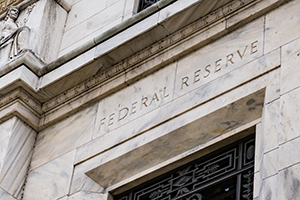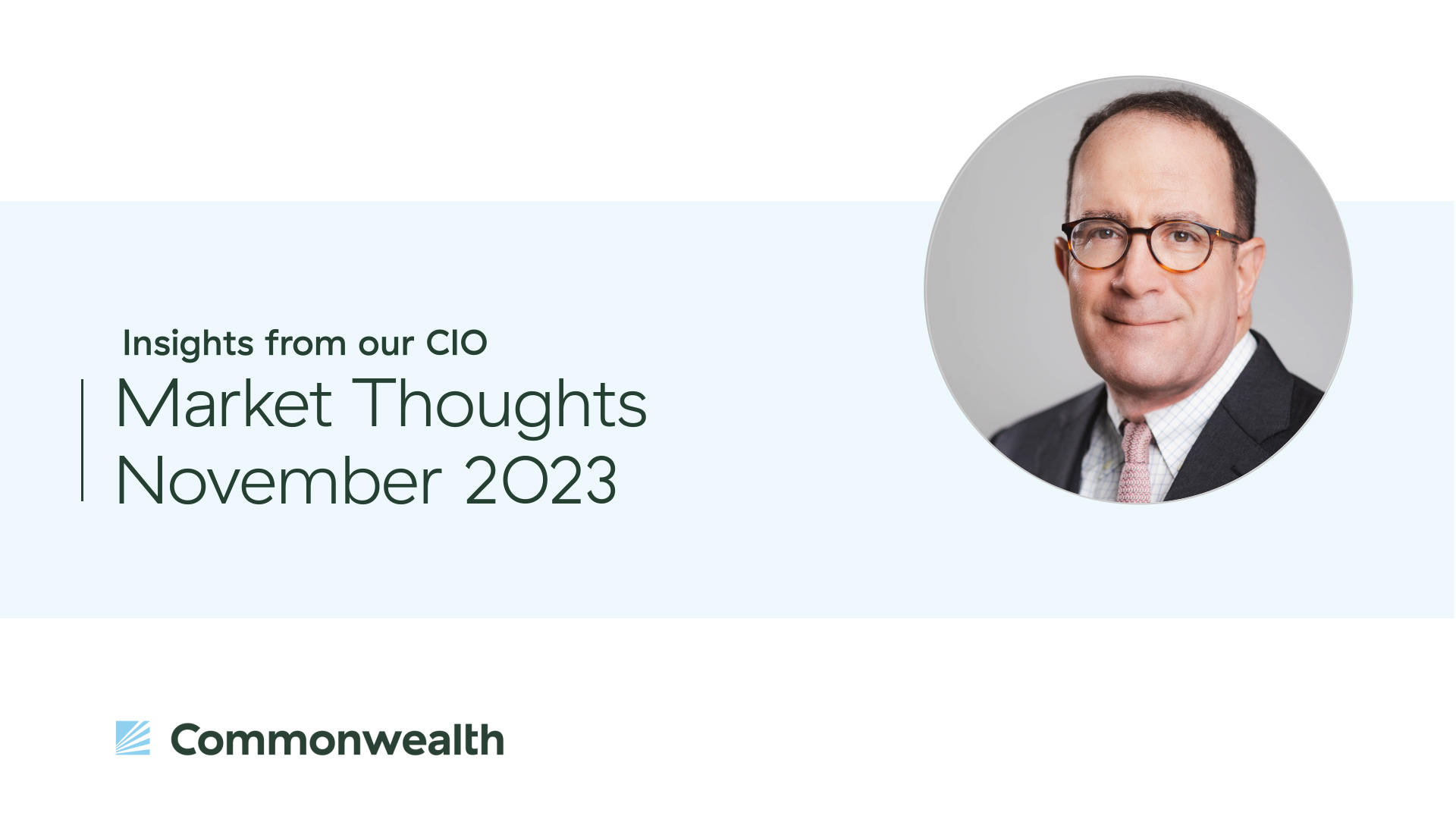The Federal Open Market Committee (FOMC) met this week and voted unanimously to hold rates steady for the second consecutive meeting. This leaves its policy range at 5.25 percent to 5.5 percent. After a historic run where the committee increased that range by 5.25 percent over the course of 11 meetings, no change can certainly feel like a change. So, what are the driving forces behind the continued pause? Let’s look at some of the details the FOMC is keeping its eyes on, as well as what we should be paying attention to moving forward.
Commonwealth
Market Thoughts for November 2023 [Video]
U.S. indices were down for the third consecutive month, with the Nasdaq doing the worst. International markets also pulled back, and fixed income was down. Despite the market performance, job growth remained healthy, consumer income and spending grew, and retail sales increased.
Bear Market or Intermediate Correction?
In my last blog post on whether markets might rally by year-end, I detailed a few technical indicators that suggested taking a cautious approach, as well as a reason for potential optimism. Today, I’d like to provide updates on two of those indicators, introduce new data, and wrap up with some thoughts on where we go from here.
Economic Release Snapshot: GDP Growth Accelerates in Third Quarter
Each week, we break down the latest U.S. economic reports, including what the results mean for the overall health of the economy. Here, you will find how economists’ forecasts compare with actual results, key takeaways to consider, as well as a list of what’s on tap for the week ahead.
What Mattered This Week? Markets Kept Dropping
This week was about the markets, which kept dropping even as the economic news continued to be good. Growth last quarter was well above expectations, at almost 5 percent, and personal spending increased for the sixth month in a row. Despite that good news, markets pulled back again, with the S&P 500 looking like it will slide into a correction, down more than 10 percent from the most recent peak in August.
Curbed Appeal for Would-Be Homebuyers
Being a “forever renter” is an idea many millennials (myself included) have been grappling with in recent years. Buying a home, once considered a milestone on the adulting journey, feels more out of reach than ever for some of us. I know I’m not alone in this feeling, as there are plenty of would-be homebuyers to share in my woes. So, let’s take a look at some of the barriers to homeownership now and whether there is reason to believe circumstances may change in the future or if some of us will be tenants for eternity.






 Olivia has joined Riverstone Wealth Partners providing knowledge gained from her 15 plus years in management. Olivia has provided services within the financial industry, mortgage industry, and in the non-profit sector. Olivia thrives on providing stellar customer service, accomplishing all goals set before her, and doing the right thing. Olivia’s degree in Business Management allowed her to take on roles that ultimately led her to Riverstone Wealth Partners. Olivia is currently pursuing another degree with an emphasizes in Human Resources, which she has learned over time… is her passion!
Olivia has joined Riverstone Wealth Partners providing knowledge gained from her 15 plus years in management. Olivia has provided services within the financial industry, mortgage industry, and in the non-profit sector. Olivia thrives on providing stellar customer service, accomplishing all goals set before her, and doing the right thing. Olivia’s degree in Business Management allowed her to take on roles that ultimately led her to Riverstone Wealth Partners. Olivia is currently pursuing another degree with an emphasizes in Human Resources, which she has learned over time… is her passion!




 Director of Operations
Director of Operations


 Ashley has been working in the customer service field since she started her first job at age 16. For the past ten years she worked in an office setting handling accounts payable and receivable as well as some receptionist work. She is very excited to learn more about the investment field.
Ashley has been working in the customer service field since she started her first job at age 16. For the past ten years she worked in an office setting handling accounts payable and receivable as well as some receptionist work. She is very excited to learn more about the investment field. Alec joined Riverstone after starting out his post college career on the operations side of an international logistics company working as an account executive. Graduating with a BA in Economics from the University of Illinois at Urbana-Champaign, he quickly developed a strong interest in the financial world. A lifetime resident of the Chicagoland area, Alec is an avid fan of his hometown sports teams. He is also an enthusiast of outdoor activities like fishing, camping, and hiking whenever possible.
Alec joined Riverstone after starting out his post college career on the operations side of an international logistics company working as an account executive. Graduating with a BA in Economics from the University of Illinois at Urbana-Champaign, he quickly developed a strong interest in the financial world. A lifetime resident of the Chicagoland area, Alec is an avid fan of his hometown sports teams. He is also an enthusiast of outdoor activities like fishing, camping, and hiking whenever possible. Carol has a wide variety of experiences and has worked mainly with not-for-profit organizations. She spent 20 years in fundraising and 15 years teaching in the Illinois school system while she raised her younger children. Carol lives in Sugar Grove with her husband, Ron, and their Golden Retriever, Charley. She has four children and two grandchildren. When she’s not working, Carol enjoys spending time with friends and family, running, fishing, bible study, and watching her grandchildren play sports.
Carol has a wide variety of experiences and has worked mainly with not-for-profit organizations. She spent 20 years in fundraising and 15 years teaching in the Illinois school system while she raised her younger children. Carol lives in Sugar Grove with her husband, Ron, and their Golden Retriever, Charley. She has four children and two grandchildren. When she’s not working, Carol enjoys spending time with friends and family, running, fishing, bible study, and watching her grandchildren play sports. Wealth Advisor
Wealth Advisor Wealth Advisor / Registered Principal
Wealth Advisor / Registered Principal Wealth Advisor
Wealth Advisor Wealth Advisor / Registered Principal
Wealth Advisor / Registered Principal Wealth Advisor
Wealth Advisor Wealth Advisor Assistant
Wealth Advisor Assistant Registered Relationship Assistant
Registered Relationship Assistant